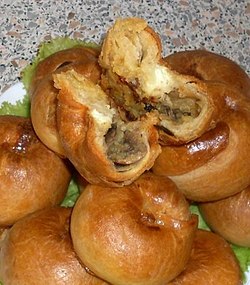Knish
 Knishes with mashed potato and fried onions | |
| Alternative names | Knysh |
|---|---|
| Type | Snack, Side Dish |
| Main ingredients | Mashed potatoes, ground meat, sauerkraut, onions, kasha or cheese |
A knish /ˈknɪʃ/ or knysh is an Eastern European[1] snack food consisting of a filling covered with dough that is either baked, grilled, or deep fried.
Knishes can be purchased from street vendors in urban areas with a large Jewish population, sometimes at a hot dog stand or from a butcher shop. It was made popular in North America by Eastern European immigrants from the Pale of Settlement (mainly from present-day Belarus, Poland, Lithuania and Ukraine).[2]
In the most East European traditional versions, the filling is made entirely of mashed potato, ground meat, sauerkraut, onions, kasha (buckwheat groats), or cheese. Other varieties of fillings include sweet potatoes, black beans, fruit, broccoli, tofu, or spinach.
Many culinary traditions feature similar baked, grilled, or fried dough-covered snacks, including the Cornish pasty, the Scottish Bridie, the Jamaican patty, the Spanish and Latin American empanada, the Middle Eastern fatayer, the Portuguese rissol, the Italian calzone, the Indian samosa, the Texan klobasnek, the Czech kolache, the Polish pierogi, the Russian pirogi or pirozhki, and the Ukrainian pyrohy or pyrizhky.
Knishes may be round, rectangular, or square. They may be entirely covered in dough or some of the filling may peek out of the top. Sizes range from those that can be eaten in a single bite hors d'oeuvre to sandwich-sized.
History
Eastern European immigrants who arrived sometime around 1900 brought knishes to North America.[3] Knish (קניש) is a Yiddish word that was derived from the Ukrainian knysh (книш) and Polish knysz.[4][5] The first knish bakery in America was founded in New York in 1910."[6] Generally recognized as a food made popular in New York by immigrants in the early 1900s, the United States underwent a knish renaissance in the 2000s driven by knish specialty establishments such as the Knish Shop in Baltimore, Maryland,[7] Buffalo and Bergen[8] in Washington, DC, or My Mother's Knish,[9] in Westlake Village, California.
See also
References
- ^ Wasserman, Tina. "Cooking: The Ultimate Jewish Finger Food". Reform Judaism Magazine. Retrieved 2010-09-14.
- ^ Silver, Laura (May 6, 2014). Knish: In Search of the Jewish Soul Food. Waltham, Mass.: Brandeis University Press. ISBN 978-1-61168-312-7.
- ^ The Oxford Companion to American Food and Drink - Google Boeken. Books.google.com. Retrieved 2013-01-21.
- ^ "Judaism 101: Jewish Cooking". Jewfaq.org. Retrieved 2013-01-21.
- ^ "knish - definition of knish by the Free Online Dictionary, Thesaurus and Encyclopedia". Thefreedictionary.com. Retrieved 2013-01-21.
- ^ (Kugel, Knishes, and Other Tasty Dishes by Nina Yellin, 2001)
- ^ "The Knish Shop, Baltimore". Jewishinbaltimore.com. Retrieved 2013-01-21.
- ^ "Gina Chersevani's Union Market Soda Shop and Bar Will Be Called Buffalo and Bergen | Food & Restaurant News". Washingtonian. 2012-05-24. Retrieved 2013-01-21.
- ^ Alan RichmanPhotograph by Martin O'Neill. "A Mother's Knishes: Alan Richman". GQ. Retrieved 2013-01-21.
